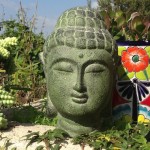Tiny Kalapas
 Here is an article by a guest author, Dr Michael Hoffman. I would like to introduce Dr Hoffman, a professional counselor who motivates his clients to overcome anxiety, depression and addiction by transforming self-limiting beliefs. His mindfulness meditation techniques help them discover new meaning in life as they grow more conscious of their psychological and spiritual potential. He is a Doctor of Addictive Disorders (Dr.AD), a Certified Hypnotherapist (CHt) and author of the popular Sober Buddha e-newsletter and blog at www.soberbuddha.com.
Here is an article by a guest author, Dr Michael Hoffman. I would like to introduce Dr Hoffman, a professional counselor who motivates his clients to overcome anxiety, depression and addiction by transforming self-limiting beliefs. His mindfulness meditation techniques help them discover new meaning in life as they grow more conscious of their psychological and spiritual potential. He is a Doctor of Addictive Disorders (Dr.AD), a Certified Hypnotherapist (CHt) and author of the popular Sober Buddha e-newsletter and blog at www.soberbuddha.com.
here is some of his poetry and writings…
TINY KALAPAS
When CNN monotony breaks my heart,
children wail for candy at cash registers,
and traffic buzz replaces birdsong,
I flee to my garden to water and weed.
Sanctuary explodes in miniature chorales
soprano buds breaking through cellulose cradles
last waters from a thousand wilting blossoms
sing tenor at their organic wake above the loam
and endless pneumatic streams drip from leaf tips
as they always have and will.
A googolplex of minute carbon dramas occurs
melodious ballads echo relentlessly
like Buddha’s kalapas of soil and light
as pistil and stamen call the fat brown bees.
Equally marvelous are my hands’
deft fingers fueled by arterial rivers
lymph and blood on capillaric freeways
with off-ramps for neighborhoods of dividing cells
built into my DNA,
this machine of loving grace.
Even the leather of my gloves
once lived thick on a bull eating grass
that waved on a prairie where the soil
let the sun in
drank the rain
and that meticulous ensemble
plays still for the wolf and the eagle.
With the last seed sewn
I sit transfixed by the garden gate
knowing every blossom in every random patch
will arise and pass away like the pointless TV news
and I hear the machinery of this impermanence
crackling like spring frost
when sprouts push through
and Gaia’s eternal trumpets ring.
– Michael Hoffman, 2011
@hellopoetry
THE VIBRATORY JOY OF VIPASSANA MINDFULNESS MEDITATION
It was the first round of meditation at a Vipassana retreat with my teacher Shinzen Young.
I settled into a comfortable, but not rigid sitting posture. I focused mindfully on the alternating sensations of cool air entering my nostrils, warm air leaving when I exhaled and the delightful still point gap between breaths.
Then gradually it started to happen, that effervescent sensation of subtle vibration spreading from my heart upward to my head and down to my feet. It felt like the finest massage, touching every cell in my body. I relaxed into it, letting go absolutely any attempt to understand it intellectually. For 30 minutes I floated in a blissful, non-cognitive volume of vibrating space. Some thoughts came and went, but seemed only like little sparks of energy without meaning or definition. I was in what brain science defines as a beta and theta wave state.
KALAPAS AND IMPERMANENCE
Shinzen had humorously referred to this body sensation phenomenon as “champagne bubbles”. He was teaching about the experience of kalapas (“particles of perception”), which according to the Buddha, are the tiniest of particles which make up both the mind and physical matter. Kalapas are said to arise and pass away trillions of times in the blink of an eye. I am continually amazed that what the Buddha described 2,500 years ago is virtually identical to what atomic and quantum physicists today call quarks, bosons and neutrinos. I had meditated my way into an experience somewhere between the physical and metaphysical worlds, rising on particles of consciousness “tens of thousands of times smaller than a particle of dust.”
I understand all this to mean that since kalapas are impermanent, and since my mind and body are composed of kalapas, my consciousness is characterized by the arising and passing away of impermanent mind and body experiences. Buddhist cosmologists call this insight into impermanence, or anicca. I must keep knowing anicca as continuously as possible, regardless of what I am doing if I want to stay in this elevated vibratory place. The Buddha’s advice is that this continuous awareness frees us from feeling stuck and victimized. When we realize that no thought, body sensation or external circumstance is permanent, we do not suffer. We can be patient and equanimous, knowing that sooner or later, our discomfort will vanish on its own. We don’t get trapped in over-reactive and self-harming efforts to make our pain go away.
STAYING AWARE
The last words of the Buddha were: “Decay (or anicca) is inherent in all component things. Work out your own salvation with diligence.” This is the core message of his 45-year teaching career. If you remember that the impermanence of anicca is inherent in all component things, you will become free of suffering.
Practicing Vipassana has had a profoundly-liberating effect on my personal psychology. My ego-mind doesn’t turn uncomfortable thoughts and feelings into permanent states of mind. I don’t get neurotically-paralyzed by anxiety. I am becoming more and more equanimous, not judging, but observing all thoughts and body sensations as the miraculous flow of kalapa energy. When I am sad, it doesn’t last very long, and when I’m happy, I’m grateful because I know happiness will continue to arise.



